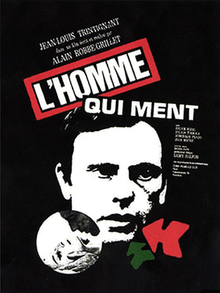The Man Who Lies
The Man Who Lies (French: L'Homme qui ment, Slovak: Muž, ktorý luže) is a 1968 French-Czechoslovak drama art film[1] directed by Alain Robbe-Grillet. It was entered into the 18th Berlin International Film Festival, where Jean-Louis Trintignant won the Silver Bear for Best Actor award.[2]
| The Man Who Lies | |
|---|---|
 Film poster | |
| Directed by | Alain Robbe-Grillet |
| Produced by | Samy Halfon Jan Tomaskovic |
| Written by | Alain Robbe-Grillet |
| Starring | Jean-Louis Trintignant |
| Cinematography | Igor Luther |
| Edited by | Bob Wade |
Release date |
|
Running time | 95 minutes |
| Country | France Czechoslovakia |
| Language | French Slovak |
Plot
The action takes place in an unspecified European country. The protagonist, dressed in contemporary clothes (Jean-Louis Trintignant) runs through the forest away from a squad of soldiers pursuing him who are dressed in German uniforms from the period of the Second World War with whom resistance fighters exchange fire. The hero is killed, but then he gets up and goes to a nearby town and presents himself to the audience as Boris Varissa, a comrade of the local resistance leader, presumably the murdered Jan Rabenau. In the tavern he tells the story about him rescuing the wounded Rabenau but it appears that no one believes him. After that he goes to a decrepit ancestral castle of Rabenau where he meets three beauties – wife of Rabenau, his sister and the maid. His new story of saving Rabenau does not convince the women either. However, Boris manages to gain a foothold in the castle, and even to have affairs with the women, although there are challenging sexual relationships between them. As the film progresses it is possible to assume that Boris is not a resistance fighter but instead a traitor, or that he is just an adventurer, or a madman. There are also doubts as to whether such a man really existed, and if there was, whether he was alive (at some point in the local cemetery a grave is shown with a Boris Varissa marker), and if alive, whether he is really Boris. Maybe it's just the spirit of the deceased Boris, and maybe he is actually Jan (at one point he claims this).
The time when the events occur is difficult to determine. Some events take place seemingly during the war (or in the memory of those who fought, or maybe in someone's imagination?). Some events seem to occur in real time but with wartime attributes superimposed. Some of the events are likely to occur or have occurred in reality, some are a reflection of memory idiosyncrasies, distorting events to varying degrees when reproduced, and some are a result of pure fiction, and clearly conscious, and sometimes it is virtually impossible to clearly separate these narrative planes. And if the events set out in the film are considered in a realistic manner, the picture appears contradictory and devoid of any unifying idea. However, looking at it as an ambiguous manifestation of different realities, a variety of possible interpretations of the same events in different circumstances and at different levels of perception, the picture appears as a complex and comprehensive study of the ways of perception, interpretation and reproduction of reality.
Cast
- Jean-Louis Trintignant as Jan Robin / Boris Varissa
- Ivan Mistrík as Jean
- Zuzana Kocúriková as Laura
- Sylvie Turbová as Sylvia
- Sylvie Bréal as Maria
- Jozef Cierny as Father
- Jozef Króner as Franz
- Dominique Prado as Lisa
- Dusan Blaskovic as Taverner
- Catherine Robbe-Grillet as Druggist
- Július Vasek as Vladimír
- Ivan Letko as German officer
References
- Cotenas, Eric. "THE MAN WHO LIES (1968) Blu-ray". DVD Drive-In. Retrieved 13 March 2017.
The Italian DVD's cover stated the aspect ratio as 1.66:1, but both HD masters are framed at 1.33:1 and the compositions look accurate and elegantly-framed with just the right amount of off-kilter framing to confirm that it's an art film
- "Berlinale 1968: Prize Winners". berlinale.de. Retrieved 3 March 2010.